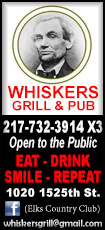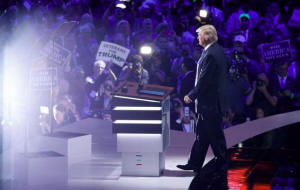|
Trump narrows gap with Clinton as
Republicans rally in Cleveland: Reuters/Ipsos
 Send a link to a friend
Send a link to a friend
 [July 20, 2016]
By Chris Kahn [July 20, 2016]
By Chris Kahn
NEW YORK (Reuters) - Republican
presidential candidate Donald Trump narrowed his deficit to Democratic
rival Hillary Clinton to 7 percentage points from 15 points late last
week, according to a Reuters/Ipsos poll released on Tuesday,
Polling was under way on Tuesday at the Republican National Convention
in Cleveland to officially nominate Trump as the party's candidate for
the Nov. 8 presidential election. Clinton is due to be officially
nominated at the Democratic convention in Philadelphia next week.
Forty-three percent of likely voters supported Clinton in the July 15-19
poll, while 36 percent supported Trump. The poll included 1,069 voters
and had a credibility interval, a measure of accuracy, of 3 percentage
points.
The previous poll, in which Trump trailed Clinton by 15 percentage
points, covered the five-day period that ended July 14.
Trump's rise appeared partly fueled by a decline in the number of voters
who remained on the sidelines. The percentage of voters who supported
neither candidate dropped to 12 percent in the July 15-19 poll from 15
percent in the July 10-14 poll.

Clinton has led in the poll most of the year.
The last time that Trump matched Clinton's level of support was in
mid-May, after his remaining rivals for the Republican nomination
dropped out and many Republican leaders started to openly support his
bid for the White House.
This week's Republican convention provides another opportunity for party
leaders to publicly embrace Trump's campaign.
Presidential nominees typically see a boost in voter support following
their party conventions. In 2012, Republican nominee Mitt Romney jumped
by about 5 percentage points in the Reuters/Ipsos poll following the
Republican convention.
[to top of second column] |

Republican U.S. presidential candidate Donald Trump appears onstage
to introduce his wife Melania at the Republican National Convention
in Cleveland, Ohio, U.S., July 18, 2016. REUTERS/Carlo Allegri

This year, however, Republican leaders have struggled to give a
full-throated endorsement of Trump's "America First" campaign over
his hard line on immigration and trade, and his fiery rhetoric that
some have called bigoted.
Many Republican elders, including both former presidents Bush and
the last two presidential nominees, Romney and John McCain, are
staying away from Cleveland.
The convention also has been marred by protests from anti-Trump
delegates and a controversy over a speech by Trump's wife, Melania,
that included a section that was strikingly similar to a portion of
the speech given by Michelle Obama at the Democratic convention in
2008 when her husband, Barack Obama, was seeking his first term as
president.
(Editing by Richard Valdmanis and Leslie Adler)
[© 2016 Thomson Reuters. All rights
reserved.]
Copyright 2016 Reuters. All rights reserved. This material may not be published,
broadcast, rewritten or redistributed.

 |